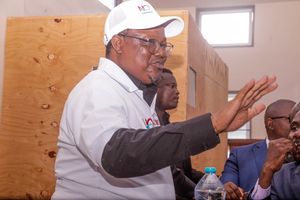ON MY MIND : Is gender inequality a technical or political question?
What you need to know:
- However, the political economy adopted lacks a coherent social gender framework which would strengthen the power of its analysis and the practical utility of its recommendations. This is unfortunate, given its recognition of the centrality of gender equality for sustainable development. In this and a future article, I will point out areas where a gender lens makes a difference in theoretical and practical terms, in order to strengthen the potential usefulness of the report.
The State of East Africa Report of 2016, titled Consolidating Misery? The Political Economy of Inequalities in East Africa, is a thought-provoking challenge to mainstream thinking and the neoliberal macroeconomic policy framework. It uses political economy to understand the political nature of growth and development, arguing that “inequalities survive thanks to the structure of the institutions we have put in place and that it is only by reforming these institutions that we can truly address the challenges that inequalities generate”.
However, the political economy adopted lacks a coherent social gender framework which would strengthen the power of its analysis and the practical utility of its recommendations. This is unfortunate, given its recognition of the centrality of gender equality for sustainable development. In this and a future article, I will point out areas where a gender lens makes a difference in theoretical and practical terms, in order to strengthen the potential usefulness of the report.
Where are the women in agriculture policy making?
Agriculture is of special importance, given the predominance of women among small-scale producers in cultivation and livestock-keeping. The report notes that subsistence agriculture is unable to guarantee a reasonable livable income for those who practice it, and enhances food insecurity because of the low incomes, inability to purchase food on the market and low production levels. It correctly points out that small-scale family production has been neglected in terms of public policy and resource support, compared to other sectors. Existing programmes often fail; leaving “an increasingly ageing workforce that relies on rudimentary technologies and is increasingly vulnerable to climate change.” Although a text box notes that most of this work force are women, this fact is not incorporated into further analysis of the power dynamics which marginalise women in policy and budget processes. Surely one dimension is that of male bias and the continued concealment of women in economic analyses and policy making, on the one hand, and the lack of a powerful enough pressure group on the other.
Instead of focusing on infrastructure and trade agreements in agriculture, for example, the research might have prioritised the question of access, ownership and decision-making power pertaining to land, livestock and other key productive assets, along with the proceeds of labour – one of the major constraints faced by women small-scale producers.
Corridor based transport systems or rural feeder roads?
In its analysis of agriculture and infrastructure the report notes that corridor based transport systems are being prioritised rather than rural feeder roads, despite the research evidence in favour of the latter. Participatory action research in Tanzania has documented how important rural feeder roads are for women, for multiple reasons that link economic, social and security considerations. They enhance access not only to markets, farm inputs, extension and financial services but also to basic education and health services; and increase the safety and security of women and children, reducing vulnerability to sexual abuse and rape.
So why don’t governments prioritise rural feeder roads? Is it the comparative power of large-scale corporations (local and foreign, and usually – though not always – male ownership/ management) to lobby for their material interests as compared to that of small-scale women producers?
Are post-harvest losses a technical or a political question?
Similarly, concern about post-harvest losses of up to 50 per cent of the value of a food crop is well placed, but the practical recommendations reduce this to a technical question without considerations of ownership and control over crops, and access to the requisite money to pay for the recommended plastic bags and metal containers. Wherever new technologies are adopted, men become the dominant actor, even in economic activities such as food storage that formerly were in the hands of women. A woman producer may make a rational choice to sustain her old-fashioned storage method and accept the 50 per cent loss rather than lose entire control of the crop.
Linking technical, political, justice and economic considerations within a feminist political economy enables proposed strategies to address at the same time the specific constraints faced by women small-scale producers arising from patriarchal structures of power and sexist discrimination and those generic to “all” small-scale producers, women and men. In the case of grain storage, improved storage technologies can be branded ‘for women’ and made accessible, with suitable and adequate financial support mechanisms that operate through existing women’s economic groups and savings and loans associations at the grassroots level.
At a more structural level, wholesale reform of the legal and judiciary systems is called for, so as to remove all forms of gender and class based mechanisms. Ultimately the main driver of male dominant structures and systems is not an amorphous ‘custom and tradition’ but the present modern state. The report aptly brings this out in the Justice section:
…Considering that the primary cause of inequalities in East Africa is the skewed access to productive resources, it is impossible to ignore the role that the legal system has played in perpetuating this state of affairs. The law has been used to dispossess traditional communities of their lands; to maintain patriarchy and to cancel claims of equity and access to resources. (my emphasis).
–– To be continued
Prof Marjorie Mbilinyi is a gender and developmentanalyst and member of TGNP Mtandao




